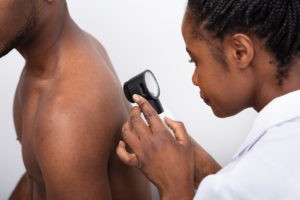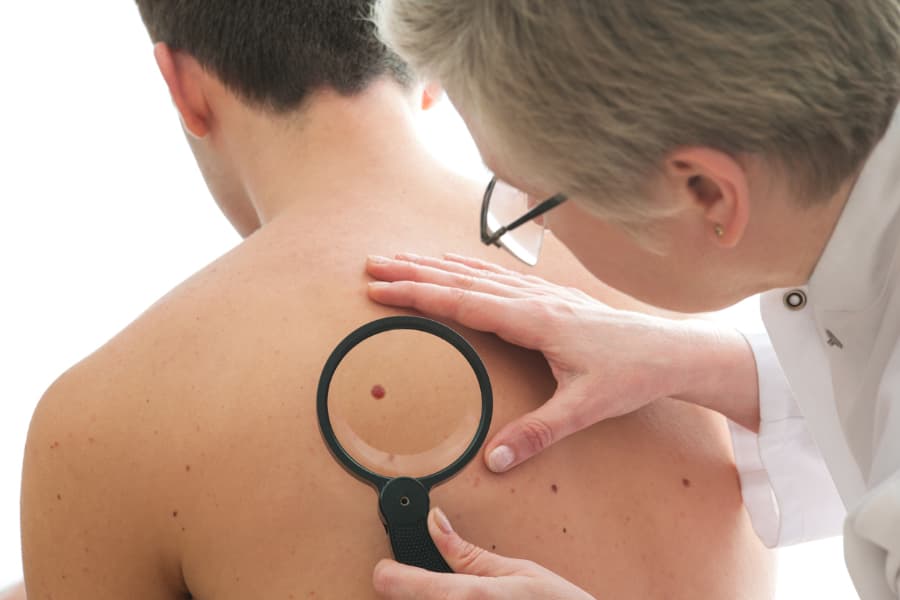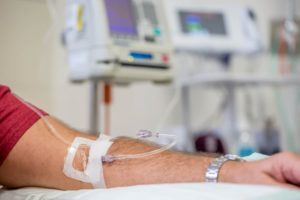
RCCA physicians in South Jersey discuss melanoma
Share on facebook Share on twitter Share on linkedin Share on email Share on print The New Jersey average of 22.2 new cases of melanoma
HIPAA Alert: Potential Data Breach Learn More
Questions on Oncology, Hematology and/or Infusion Clinical Services due to COVID-19 Crisis – CALL 833-698-1623
Important Information for Our Patients Regarding the Coronavirus.
RCCA Providing Area Cancer Patients with Access to Care During Coronavirus Outbreak
RCCA Offering Patients Virtual Visits During Coronavirus Pandemic
Anyone can develop skin cancer, but several risk factors may increase the likelihood that a person will experience the disease. People with these risk factors should be especially focused on skin cancer prevention to preserve their health and well-being.
The oncologists and other healthcare professionals at Regional Cancer Care Associates (RCCA) are well-trained and experienced in using the latest approaches to treat melanoma, as well as other forms of skin cancer that have reached advanced stages. With 25 conveniently located offices throughout New Jersey, Connecticut, Massachusetts, and the Washington, D.C., area, Regional Cancer Care Associates is a trusted source for excellent skin cancer care provided close to home.
Broadly, skin cancer is the genetic mutation and abnormal reproduction of the skin, the body’s largest organ. It is the most common form of cancer. Skin cancer manifests as three main types, which are:
Melanoma is responsible for the most deaths of any skin cancer because it can metastasize quickly, spreading to other parts of the body.
Beyond these three major forms of skin cancer, there also are other, less common skin cancers, such as Merkel cell carcinoma, a rare but very serious disease that occurs when Merkel cells located next to nerves in the skin, become cancerous.
Early recognition of skin cancer is a key to successful treatment. People should conduct regular self-examinations of their skin using the ABCDE method, as follows:
If any or all these signs are present, consult a primary care doctor or dermatologist. In addition to these indicators, other signs that may indicate potential skin cancer include:
Early detection is crucial no matter what type of skin cancer is found, but this is particularly true in the case of melanoma. If treated before spreading to surrounding lymph nodes, the five-year survival rate for melanoma is 99%. That figure slips to 30% if it spreads to distant organs.

Several risk factors can increase the chances of a person developing skin cancer, although sun exposure by far poses the greatest risk for developing melanoma or another form of skin cancer. The more ultraviolet (UV) rays the skin encounters, the greater the chance skin cells will become malignant.
Other factors that increase the risk of contracting skin cancer include:
Additionally, age can contribute to the likelihood of developing skin cancer. The American Cancer Society reports that the average age at skin cancer diagnosis is 65.
Several effective and targeted treatments for skin cancer are available at Regional Cancer Care Associates. These options include:
Immunotherapies harness the power of the body’s own immune system to identify and attack cancerous cells.
Administered orally or intravenously, chemotherapy (“chemo”) drugs kill cancerous cells, using the bloodstream as a pathway to reach malignant cells. Chemo is frequently used in conjunction with surgery or radiation.
Targeted therapy is similar to chemotherapy, except the drugs used focus specifically on mutations in the cancerous cells.
Radiation therapy uses high-energy rays, such as electrons, protons, or X-rays, among other beams and particles, to slow or eliminate skin cancer cells. It can also be used to treat returning skin cancers.
In addition to the above therapies offered at RCCA, dermatologists and dermatologic surgeons in some cases will use approaches such as Mohs micrographic surgery or cryosurgery to treat skin cancers.
The oncologists and other cancer specialists at Regional Cancer Care Associates have extensive experience treating patients with skin cancer using the latest therapies. With offices across New Jersey, Connecticut, Massachusetts, and the Washington, D.C. area, RCCA offers patients expert, compassionate care and advanced treatment for cancers and blood disorders. Visit one of these office locations today to learn more about skin cancer treatment or to request an appointment.
From empowering you with information and tools to fully understand skin cancer, to treating it quickly and comprehensively, RCCA is committed to your care. As one of the nation’s largest cancer physician networks, we have the reach, the resources and the localized accessibility to treat your very individualized needs with top-quality care and unfailing compassion.
For more information, or to schedule an appointment, call (844) 346-7222. You can also schedule an appointment by calling the RCCA location nearest you.

Share on facebook Share on twitter Share on linkedin Share on email Share on print The New Jersey average of 22.2 new cases of melanoma

If you or a loved one has been diagnosed with cancer, doctors can choose from many treatments to provide the best care possible for each

East Coast residents are no strangers to winter weather, and those long, chilly months tend to make time under the summer sun that much more appealing.
When standard cancer treatments aren’t providing the results you want, clinical trials may offer hope. Our physicians use clinical trials to study new treatments, helping transform cancer care for the better. You can enroll in a clinical trial to try groundbreaking treatment plans at zero cost to you.

Regional Cancer Care Associates is one of fewer than 200 medical practices in the country selected to participate in the Oncology Care Model (OCM); a recent Medicare initiative aimed at improving care coordination and access to and quality of care for Medicare beneficiaries undergoing chemotherapy treatment.